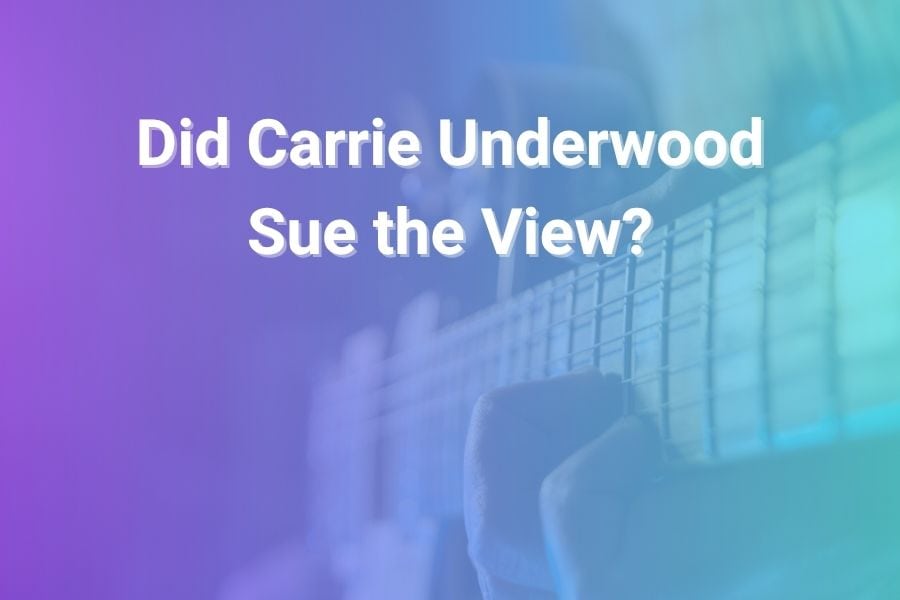
Rumors can spread like wildfire in today’s digital world, especially when they involve celebrities and popular talk shows. Recently, social media users were flooded with claims that country superstar Carrie Underwood had filed an $800 million lawsuit against The View.
The story grabbed attention across platforms, fueling speculation about a major legal battle between the Grammy-winning artist and the long-running ABC talk show. However, after digging into the facts, it becomes clear that these viral claims don’t hold up under scrutiny.
Here, you will learn what sparked the rumor, what trusted outlets have confirmed, and why misinformation spreads so easily in celebrity culture today.
Understanding How the Rumor Started
The rumor about Carrie Underwood suing The View first appeared in late 2024, when social media posts began circulating screenshots suggesting the singer had taken legal action over comments allegedly made about her. The claim quickly gained momentum on platforms like Facebook, X (formerly Twitter), and TikTok. Some posts even included fabricated quotes, claiming that Underwood accused The View hosts of defamation and emotional distress.
People who shared the story often referenced vague “news reports,” but none of these linked to a credible source. Instead, the posts originated from websites designed to look like entertainment outlets, using clickbait headlines to attract attention. Once these posts went viral, the rumor took on a life of its own, with thousands of users discussing it as if it were confirmed news.
Fact-Checking and Reality Check
When reputable entertainment sites such as IMDb News, Yahoo Entertainment, and MSN reviewed the situation, they found no record of any lawsuit filed by Carrie Underwood against The View or any of its hosts. There were no court filings, public statements, or official press releases supporting the claim. Snopes, the well-known fact-checking organization, also examined the rumor and confirmed that there was “no evidence whatsoever” of a legal case.
Carrie Underwood herself has not made any public comment indicating any dispute with The View. In fact, she has not appeared on the show in years and has maintained a professional distance from daytime talk show controversies. The supposed “$800 million lawsuit” appears to have been entirely fabricated, likely to drive clicks and engagement online.
How Fake News Gains Momentum
In today’s social media environment, misinformation can gain speed within hours. False stories often thrive because they combine a recognizable celebrity, a controversial topic, and a large platform like The View. These three elements guarantee strong reactions from fans on both sides.
Algorithms on social media tend to reward high engagement — meaning posts that spark outrage, shock, or curiosity get promoted faster. As users share or comment without verifying the source, fake stories appear more credible. By the time fact-checkers intervene, the misinformation may already have reached millions.
Another factor is how fake news sites manipulate visual design. Many of the viral posts about Underwood’s alleged lawsuit used images of her at award shows alongside The View’s logo, giving the illusion of authenticity. For casual readers scrolling quickly, such combinations can easily appear legitimate.
Why Carrie Underwood Was Targeted
Carrie Underwood’s reputation as a clean, family-oriented artist makes her a perfect subject for sensational stories. With more than 12 million albums sold and countless awards, she has maintained a positive image throughout her career. That kind of visibility attracts both admiration and false rumors.
Over the years, celebrities who avoid controversy often become unexpected targets for gossip because audiences are drawn to the shock of seeing them “involved in scandal.” Underwood’s reserved nature and low social media presence make her less likely to immediately refute such claims, leaving room for speculation.
The Power of Celebrity Rumors
Celebrity rumors hold a unique power in American pop culture. They blend entertainment, curiosity, and moral judgment into a single story. According to a 2024 Pew Research study, nearly 67% of U.S. adults encounter celebrity news through social media at least once a week, and about half of them don’t verify the source before reacting. That combination of visibility and passivity allows misinformation to thrive.
In Underwood’s case, the rumor about suing The View played into an ongoing cultural narrative — fans versus media. Many viewers see talk shows like The View as overly political or combative, while others view celebrities as too sensitive. This tension provides fertile ground for false claims that reinforce those biases.
What The View Actually Said
Some users claimed that The View hosts had insulted Underwood for her personal beliefs or criticized her career, leading to the supposed lawsuit. However, transcripts and recordings from recent episodes show no mention of Underwood by any of the co-hosts, including Whoopi Goldberg, Joy Behar, or Sara Haines. The show’s producers have not acknowledged any legal complaint either.
This confirms that the claim had no factual basis. It was built entirely from recycled gossip and AI-generated clickbait articles, which are increasingly common in 2025.
The Rise of AI-Generated Misinformation
A growing number of fake entertainment stories are now produced using automated content tools. These systems scrape trending keywords and build convincing fake articles within minutes. Many of the websites pushing the Underwood lawsuit rumor used identical wording and formatting, suggesting automated generation.
AI-generated misinformation can look polished and convincing, especially when it borrows elements from real reporting styles. Experts warn that such technology will continue to blur the line between legitimate journalism and fabrication. That’s why readers need to cross-check major claims with recognized outlets.
Why the $800 Million Figure Was Chosen
The alleged $800 million amount made the rumor especially viral. It’s a number so large that it automatically sparks disbelief and intrigue. By comparison, the biggest celebrity defamation settlements in recent years — such as Johnny Depp vs. Amber Heard — involved tens of millions, not hundreds.
Choosing an exaggerated figure like $800 million is a common tactic in fake news because it triggers emotional reactions. It implies outrage, drama, and moral conflict — exactly what social media thrives on.
Carrie Underwood’s Focus in 2025
While the internet obsessed over a non-existent lawsuit, Carrie Underwood remained focused on her career. As of 2025, she continues her Las Vegas residency at Resorts World Theatre, performing to sold-out crowds. Her latest projects include a new album release and several high-profile performances at country music festivals across the U.S.
Underwood also continues to engage with fans through fitness initiatives and her activewear brand, CALIA. Her team has stayed silent about online rumors, reinforcing that she prefers to let her work speak for itself.
The Importance of Media Literacy
The viral Underwood story underscores why media literacy is more crucial than ever. Every user scrolling social feeds becomes part of the information chain — and every share helps shape what spreads next. Taking a few seconds to verify before reposting can prevent the amplification of false claims.
Key habits include:
- Checking whether the claim appears on verified news outlets.
- Looking for a direct statement from the person or their representative.
- Noting exaggerated numbers or emotional language, which are red flags for fake news.
If more users followed these steps, rumors like the Underwood lawsuit would vanish much faster.
Lessons from This Episode
- Fame attracts fiction. The more famous the person, the higher the chance of becoming the center of a false story.
- Silence fuels speculation. When a celebrity doesn’t respond, people fill in the blanks.
- Engagement algorithms amplify extremes. Social media favors sensational content, even when it’s false.
- Fact-checkers are essential. Trusted organizations play a vital role in debunking misinformation before it damages reputations.
No Lawsuit, No Feud
To sum it up plainly: Carrie Underwood has not sued The View. No lawsuit has been filed, no statements have been made, and no reliable media organization has confirmed any conflict between them. The viral story exists only in the imagination of social media users and clickbait publishers.
Instead of legal drama, Underwood continues to focus on her music and personal projects. Fans can rest assured that the artist’s career remains as strong as ever, untouched by internet gossip.
Why Stories Like This Matter
Even though the rumor turned out false, it highlights the fragility of online truth. A single false claim can erode trust and distract audiences from real issues. In an age where nearly anyone can publish “news,” it’s up to readers to uphold accuracy.
For celebrities, false rumors can impact brand partnerships, mental health, and public perception. For fans, they serve as a reminder to question everything that sounds too dramatic to be true.
Final Thoughts
The story of Carrie Underwood and The View is not one of legal battles or massive settlements — it’s a cautionary tale about how easily fiction becomes “fact” online. With technology accelerating the spread of misinformation, discernment becomes the most powerful defense.
Underwood’s name may have trended for the wrong reasons, but the truth remains clear: she did not sue The View. And as long as readers keep seeking verified facts over viral noise, the truth will continue to win out, even in a world that thrives on rumor.
